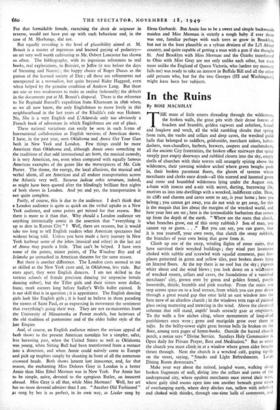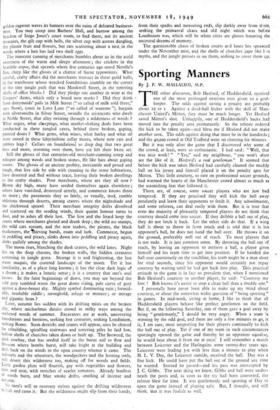In the Ruins
By ROSE MACAULAY
THE maze of little streets threading through the wilderness, the broken walls, the great pits with their dense forests of bracken and bramble, golden ragwort and coltsfoot, fennel and foxglove and vetch, all the wild rambling shrubs that spring from ruin, the vaults and cellars and deep caves, the wrecked guild
halls that belonged to saddlers, goldsmiths, merchant tailors, haber- dashers, wax-chandlers, barbers, brewers, coopers and coachmakers, all the ancient City fraternities, the broken office stairways that spiral
steeply past empty doorways and rubblcd closets into the sky, empty
shells of churches with their towers still strangely spiring above the wilderness, their yawning window arches where green boughs push in, their broken pavement floors, the ghosts of taverns where merchants and clerks once drank—all this scarred and haunted green and stone and brambled wilderness lying under the August sun, a-hum with insects and a-stir with secret, darting, burrowing life, receives us into into dwellings with a wrecked, indifferent calm. Here, its cliffs and chasms and caves seem to say, is your home ; here you
belong ; you cannot get away, you do not wish to get away, for this is the maquis that lies about the margins of the wrecked world, and here your feet are set ; here is the irremediable barbarism that comes
up from the depth of the earth. " Where are the roots that clutch, what branches grow, out of this stony rubbish ? Son of man, you cannot say or guess. . . ." But you can say, you can guess, that it is you yourself, your own roots, that clutch the stony rubbish, the branches of your own being that grow from it.
Climb up one of the steep, winding flights of stone stairs, that have survived their wrecked buildings ; they wind past lavatories choked with rubble and scrawled with squalid comment, past fire- places patterned in green and yellow tiles, past broken doors lying on littered floors. At the top there is no roof but the sky ; pigeons whirr about and the wind blows ; you look down on a wilderness of wrecked streets, cellars and caves, the foundations of a vanished merchants' city, grown over by green and golden fennel, purple
loosestrife, thistle, bramble and pink rosebay. From the stairs you step across space on to a lead terrace, from which you can peer down through a great round gap that once held an east window into the
bare nave of an altarless church ; in the windows torn rags of painted
glass swing muttering and teetering in the wind. Above the clusterA columns that still stand, angels' heads serenely gaze at emptine,s.
To the walls a few niches cling, where monuments of long-cad
parishioners once were ; grass and marigolds grow over them in tufts. In the belfry-tower eight great bronze bells lie broken on the
floor, among torn pages of hymn-books. Outside the barred chord'
porch, a notice says "Divine Service. Sundays Holy Communion ti. Open daily for Private Prayer, Rest and Meditation." But to enter the church you must climb in at a window where green alder boughs thrust through. Next the church is a wrecked café, gaping tipsily' on the street, saying, " Snacks and Light Refreshments. La, gc Dining Room downstairs."
Make your way about the ruined, junglcd waste, walking along broken fragments of wall, diving into the cellars and caves of the underground city, where opulent merchants once stored their wine, where gaily tiled rooms open into one another beneath great ca“:9 of overhanging earth, where deep ditches run, yellow with coltsto.,t and choked with thistles, through one-time halls of commerce, and golden ragwort waves its banners over the ruins of defeated business- men. You may creep into Barbers' Hall, and burrow among the bracken of Inigo Jones's court room, to find there, not its ancient treasures, the gilt cup with bells, the silver cup with acorns dangling, the plaster fruit and flowers, but rats scuttering about a nest, in the weeds where a hen has laid two shell eggs.
The innocent cunning of merchants bumbles about us in the acrid sweetness of the warm and sleepy afternoon ; the crickets in the bramble copse, that sprawls where five centuries ago stood Neville's Inn, chirp like the ghosts of a chatter of burnt typewriters. What careful, crafty affairs did the merchants transact in these guild halls, in the warehouse whose wrecked foundations crumble on the corner of the tiny jungle path that was Monkwell Street, in the tottering shells of office blocks ? Did they pledge one another in wine at the Coopers' Arms, which only a board now marks ? Did they drink from dairymaids' pails in Milk Street (" so called of milk sold there," says Stow), court in Love Lane ("so called of wantons "), bargain with silversmiths in Silver Street, swindle the aristocrats who dwelt in Noble Street, that alley twisting through a wilderness of weeds ? What orgies, what cheepings, what market-shaking deals have been conducted in these jungled caves, behind these broken, gaping, painted doors ? What gems, what wines, what barley and what oil were stored in these labyrinthine cellar mazes, where now rats and rabbits leap ? Cellars on foundation; so deep dug that two great fires and more, storming over them, have yet lett their bases set.
Still the ghosts of that centuries-old merchant-cunning creep and whisper among weeds and broken stones, flit like bats about gaping rooms. The ghosts of an ancient probity, mercantile and proud and tough, that live side by side with cunning in the stone habitations, have deserted and fled without trace, leaving their broken dwellings to the crafty shades. Poor merchants, where are they all now ? Blown sky high, many have seeded themselves again elsewhere ; others have vanished, destroyed utterly, and commerce knows them no more ; the pavements they so lately, so venally, trod, ramble oblivious through deserts, among craters where the nightshade and the chickweed sprawl. Their merchant integrity drifts dissolved I and scattered on the seeding winds, their quaint honour turns to dust, and to ashes all their lust. The lion and the lizard keep the courts where merchants gloried and drank deep ; the wild ass stamps, the wild cats scream, and the new traders, the pirates, the black marketeers, the 'thieving bands, roam and lurk. Commerce, begun in peddling and piracy, slinks down into peddling and piracy again, slinks guiltily among the shades.
The moon rises, blanching the dusk craters, the wild lanes. Night lies on the deep chasms, the broken walls, the hidden creatures scuttering in jungle grass. Strange it is and frightening, the lost waste maquis, the cratered landscape of the moon. Yet it has familiarity, as of a place long known ; it has the clear dark logic of a dream ; it makes a lunatic sense ; it is a country that one's soul knows. In the faint beginnings of dawn, you may see beyond the cold grey tumbled waste the great dome riding, pale curve of grey against a dove-breast sky. Mighty symbol dominating ruin ; formid- able, insoluble riddle ; stronghold, refuge or menace ; or mirage and gigantic hoax ?
Later, autumn lies sodden with its drifting mists on the broken City, where michaelmas daisies crowd in milky ways among the withered weeds of summer. Excavators are at work, uncovering foundations and bastions, seeking lost centuries, seeking Londinium, seeking Rome. Soon derricks and cranes will appear, sites be cleared for rebuilding, spiralling stairways and tottering piles be laid low, hollow shells of churches taken down or built up. The fireweed, the pink rosebay, that has seeded itself in the burnt soil to flow and blossom where bombs burst, will take fright at the building and drift back on the winds to the open country whence it came. The redstarts and the wheatears, the woodpeckers and the hooting owls, will desert this wilderness too, making off for woods and fields. Little garden plots will flourish, gay with vegetables and flowers, trim and neat, with trenches of scarlet tomatoes. Already bonfires of weeds burn, and blue smoke drifts, smelling of incense and autumn.
So men's will to recovery strives against the drifting wilderness to halt and tame it. But the wilderness might slip from their hands,
from their spades and measuring rods, slip darkly away from them, seeking the primaeval chaos and old night which was before Londinium was, which will be when cities are ghosts haunting the ancestral dreams of memory.
The questionable chaos of broken courts and lanes lies sprawled under the November mist, and the shells of churches gape like It .q myths, and the jungle presses in on them, seeking to cover them up.















































































 Previous page
Previous page